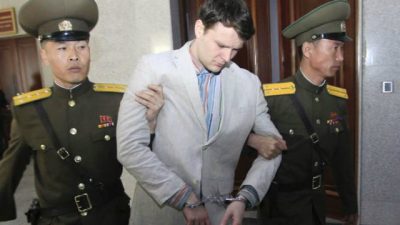The Otto Warmbier Scandal Is All About Challenging Trump’s Credibility

The Washington Post’s surprise revelation that Trump agreed to pay North Korea $2 million in exchange for releasing imprisoned student Otto Warmbier is intended to challenge his credibility by drawing “politically uncomfortable” comparisons between him and his predecessor.
***
The Washington Post published a surprise revelation late last week alleging that Trump agreed to a North Korean demand that the US pay $2 million in “hospital bills” in exchange for releasing imprisoned student Otto Warmbier, a claim that the American leader promptly denied. In his tweet, Trump wrote that
“No money was paid to North Korea for Otto Warmbier, not two Million Dollars, not anything else. This is not the Obama Administration that paid 1.8 Billion Dollars for four hostages, or gave five terroist hostages plus, who soon went back to battle, for traitor Sgt. Bergdahl!”
His rebuke was obviously meant to preemptively contradict any comparisons between him and his predecessor that his political foes might attempt to draw in an effort to challenge his credibility by exposing his attacks against the Obama Administration for those two aforementioned events as the height of hypocrisy.
This is relevant in the current domestic political context because former Vice President Joe Biden just announced that he’ll be running as the Democrats’ candidate for president so it’s predictable that Trump will try to tie him to all of the many Obama-era scandals such as the two that he touched upon in his tweet. That might be more difficult to do nowadays after the Washington Post’s revelation in spite of Trump and National security Advisor Bolton‘s insistence that no money was ever paid even though Special Representative for North Korea Joseph Yun signed a document promising to do so after receiving authorization from the American leader himself. It’s therefore unclear exactly what transpired during that time nearly two years ago, but another question that naturally arises is about the timing of this very report. It’s unlikely that the Washington Post knew about this from the get-go but held onto the story until now, so it must have just been tipped off about it fairly recently.
Trump’s many “deep state” enemies are actively working to undermine his foreign policy, but it’s strange that not one of them leaked this scandalous detail to the media earlier when the revelation could have ruined his two summits with Chairman Kim. It could very well be that the sources didn’t come across this information until now, but that still doesn’t answer the question of why the original holder(s) of this knowledge didn’t share it with those individuals until now. One possible explanation could be that it it was carelessly revealed during casual conversation while another might be that the individual(s) was triggered to do so for one reason or another, perhaps pertaining to the Hanoi Summit’s failure or some other matter. Either way, the political consequences of this report are that it casts doubt on Trump’s much-touted negotiating prowess and also makes Kim lose “face” after he met with his American counterpart despite supposedly not having received any money for Warmbier’s release.
Altogether, the combined effect is that Trump might have more difficulty discrediting Biden for the Obama era’s many scandals just like he might also have difficulty restarting the North Korean nuclear talks. The Mainstream Media also has another scandal to harp on about after Russiagate was exposed as a hoax driven by a shadowy cabal of coup plotters inside the country’s permanent bureaucracy, therefore giving Trump’s enemies an opportunity to distract Americans with this the juicy narrative that he might have swallowed his principles and cut a deal with a “dictator” despite accusing Obama of doing the same thing vis-a-vis Iran. Only time will tell whether this scandal has the same staying power as Russiagate or if it’ll just fizzle out like practically every other one surrounding the Trump Administration, but it’s nevertheless interesting to think about its timing and possible overall political implications.
*
Note to readers: please click the share buttons below. Forward this article to your email lists. Crosspost on your blog site, internet forums. etc.
Andrew Korybko is an American Moscow-based political analyst specializing in the relationship between the US strategy in Afro-Eurasia, China’s One Belt One Road global vision of New Silk Road connectivity, and Hybrid Warfare. He is a frequent contributor to Global Research.

